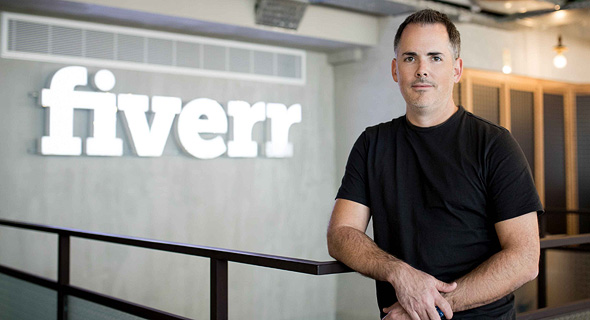Veteran VCs Vanished Because They Got in the Way of Entrepreneurs, Says Fiverr CEO
Micha Kaufman spoke Monday at a conference on trends and forecasts in Israeli venture capital
The Israeli venture capital funds that were around 15 years ago got in the way of entrepreneurs who wanted to raise money in additional financing rounds, ultimately weakening them, according to Micha Kaufman, founder and CEO of online gig marketplace Fiverr Int. Ltd. Kaufman spoke Monday at a conference in Tel Aviv dedicated to trends and forecasts for the Israeli venture capital market.
The event was organized by Fusion LA, a Los Angeles-based accelerator program for Israeli startups, and by the law firm Pearl Cohen Zedek Latzer Baratz.
 Fiverr CEO Micha Kaufman. Photo: Omer Hacohen
Fiverr CEO Micha Kaufman. Photo: Omer Hacohen "It is a good thing that the old generation is no longer around," Kaufman said. "Their departure and the entrance of strong foreign funds and local funds with more longterm vision improved our ability to think ahead."
Erez Shachar, managing partner at Qumra Capital, moderated the event. Speaking about his experience managing growth companies. "My world was very narrow, and I was very focussed on what I did," he said. "Sometimes, I feel that CEOs are very focused on the organization, and have no connection to parallel worlds." According to Shachar, it is essential to ask how you experienced the changes in the Israeli ecosystem in the past 10 years. "As executives, you have to ask yourselves if you felt the changes to the ecosystem along the way, or do you notice them only when they directly concern you and your companies?"
According to Kaufman, the information revolution had a major influence on the tech sector. "When I started my entrepreneurial journey 20 years ago, there wasn't a single book about entrepreneurship, and that's without mentioning blogs or Google. Nothing. I was clueless," he said. "In contrast, during Fiverr's IPO process, which we began two years ago, there were so many sources of information. Now there are quite a few Israeli companies that have done it, and if someone is thinking about an IPO in the next few years, then talk to me."
According to Eynat Guez, CEO of payroll management startup Papaya Global Ltd., the most outstanding change that has occurred in the Israeli tech sector in recent years is that it has become impossible to tell entrepreneurs or CEOs what to do. "All the attempts to teach you or force all kinds of rules of the game are no longer relevant. The CEOs know what's right for them and for their company," she said.
Asked how he builds strong management in a growth company, Kaufman said that at Fiverr, all senior management is based in Israel. According to Kaufman, one of the most important lessons that he learned on his journey - is that there are a lot of impressive American managers, but there are also a lot of talented managers in Israel, so they had to build a joint team from both countries.
"We hired American and Israeli managers and each of them has advantages and disadvantages because ultimately they are people," Guez said. "When you have a range of people with different languages and those who come from different places, it creates an open organization that is suitable for everybody."
Also speaking at the event, Guy Lachmann, senior partner at Pearl Cohen Zedek Latzer Baratz, predicted that the hottest tech sectors in 2020 would be digital health and agtech. "We see more and more players joining the market and investing large sums of money in early stage companies," he said. "But despite the growth in financing rounds, Israeli companies are still being underpriced compared with Silicon Valley," he added.



